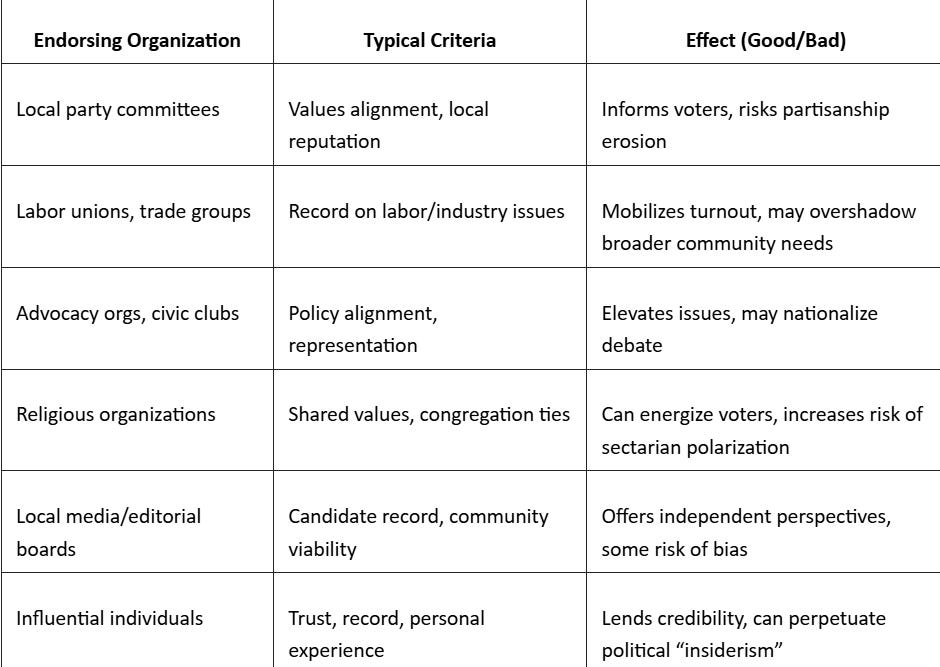Reality Check on Nonpartisan Local Elections
Local endorsements, for all their imperfections, may be among the last remaining tools to ensure that local voices—not just national party strategists—shape the direction of America’s cities and towns
By Phil Huber
GUEST COLUMNIST

Nonpartisan local elections in the United States emerged from Progressive Era reforms in the late 19th and early 20th centuries. Reformers sought to curb the influence of party machines, corruption, and patronage in city governments by:
Eliminating party labels from ballots in city council, mayoral, and school board races.
Focusing campaigns on community needs—public safety, infrastructure, education—rather than partisan loyalties.
Encouraging civic engagement based on local, rather than ideological or national, identities.
By the late 20th century, most American cities used nonpartisan structures for local offices, with about 75% of city councils and 90% of school boards holding nonpartisan elections.
A parallel, transformative shift began in the mid-1990s under Newt Gingrich, then-Speaker of the House. The Republican Party, using strategies like the “Contract with America,” nationalized congressional campaigns, standardizing messaging, and sharply polarizing House and Senate races. This nationalization included:
Coordinated national themes and attacks, diminishing the importance of local or district-specific issues in federal campaigns.
Instituting partisan discipline and amplifying polarization, which reshaped not just Congress but also the way voters perceived politics at every level.
As federal politics became more polarized and nationalized, similar trends gradually bled into local government:
The breakdown of local news and rise of national media outlets decreased coverage of community-specific issues, broadening the reach of national political narratives.
The growth of national party influence—particularly via major donors, Super PACs, and advocacy groups—meant local races were increasingly used as battlegrounds for national issues (e.g., immigration, school curricula, policing).
Recent social media trends have amplified national party cues and uniformly spread culture war debates into school board and city council elections across the country.
Under Donald Trump, nationalization of local elections drastically intensified:
Federal directives and executive orders (e.g., immigration enforcement, sanctuary city crackdowns) forced local governments and officials—often into nonpartisan roles—to pick sides on divisive national issues.
Election administration became a partisan lightning rod, as Trump’s rhetoric on election integrity placed nonpartisan officials at the center of heated national debate.
Culture war battles over topics like curriculum, LGBTQ+ rights, or policing, imported by national media and activist groups, dominated once-local races.
Outside money and endorsements from national PACs and advocacy groups flooded local contests, further eroding any pretense of nonpartisanship.
Public distrust and polarization stroked by repeated claims of election fraud and attacks on civic institutions—diminished faith in the independence of nonpartisan local offices.
Despite the nonpartisan intent, a growing set of organizations endorse candidates in local elections:
Well-intentioned endorsements can inform otherwise low-information electorates, drive turnout, and offer accountability. However, they can also inject greater polarization, bring “proxy wars” for national issues, and crowd out genuine local concerns.
By the mid-2020s, the fusion of Gingrich-era nationalization tactics and the hyperpolarized Trump era means:
Local elections, even without party labels, increasingly reflect national partisan divides.
Local offices—school boards, councils—are more likely to be battlegrounds for issues dictated by national party strategists, rather than homegrown priorities.
Outside money and media amplify national concerns, making it harder for candidates focused on local problem-solving to compete.
Nonpartisan election administrators face unprecedented pressure and scrutiny based on national loyalty tests.
Efforts to preserve or restore nonpartisan norms are both more challenging and, paradoxically, more urgent.
With local issues threatened by nationalized campaigns, the value of local endorsements may increase:
Local party, civic, and community group endorsements can offer voters trusted signals about candidates’ roots and real investment in local challenges.
These endorsements, rooted in community knowledge, can help bridge the informational gap widened by the decline of local journalism.
They provide a counterweight to distant donors and national messaging, anchoring elections in the community’s immediate needs.
Yet this solution comes with risks. The more partisan these processes become—even at the local level—the harder it can be to maintain the collaborative, community-first orientation nonpartisan elections were intended to foster.
From their Progressive roots to the present day, nonpartisan local elections have been reshaped by the same forces that revolutionized national politics beginning with the Gingrich era and reaching new heights under Trump. While the original goal was to focus on community over partisanship, today’s reality is one of escalating nationalization. In this environment, local endorsements, for all their imperfections, may be among the last remaining tools to ensure that local voices—not just national party strategists—shape the direction of America’s cities and towns.
Can we go back to nonpartisan elections? If you have suggestions, please send them to FXBG Advance to share with everyone.
Phil Huber lives in Fredericksburg.
Support the Advance with an Annual Subscription or Make a One-time Donation
The Advance has developed a reputation for fearless journalism. Our team delivers well-researched local stories, detailed analysis of the events that are shaping our region, and a forum for robust, informed discussion about current issues.
We need your help to do this work, and there are two ways you can support this work.
Sign up for annual, renewable subscription.
Make a one-time donation of any amount.
Local Obituaries
To view local obituaries or to send a note to family and loved ones, please visit the link that follows.
This article is published under Creative Commons license CC BY-NC-ND. It can be distributed for noncommercial purposes and must include the following: “Published with permission by FXBG Advance.”














So the reason that the local Democrat committee chose to endorse and make local elections partisan it because of Republicans, specifically Newt Gingrich and Donald Trump?
An ironic and delusional position since the local Republican Committee is the one advocating for non-partisanship and seeking local bipartisan efforts.